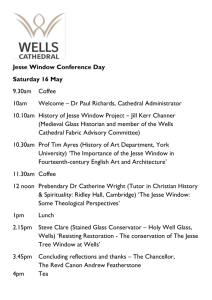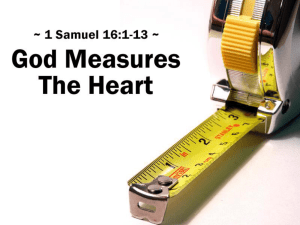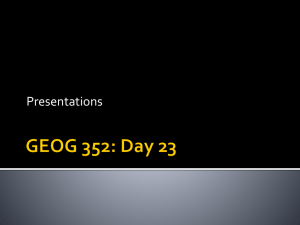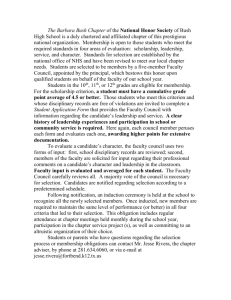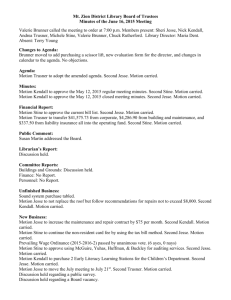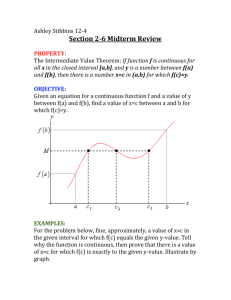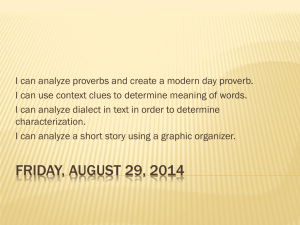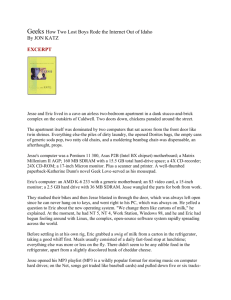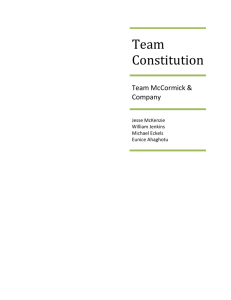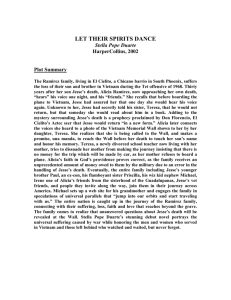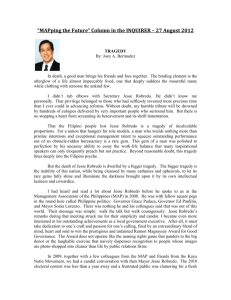OTHER LIVES Biography At the crossroads of U.S. 177 and State
advertisement
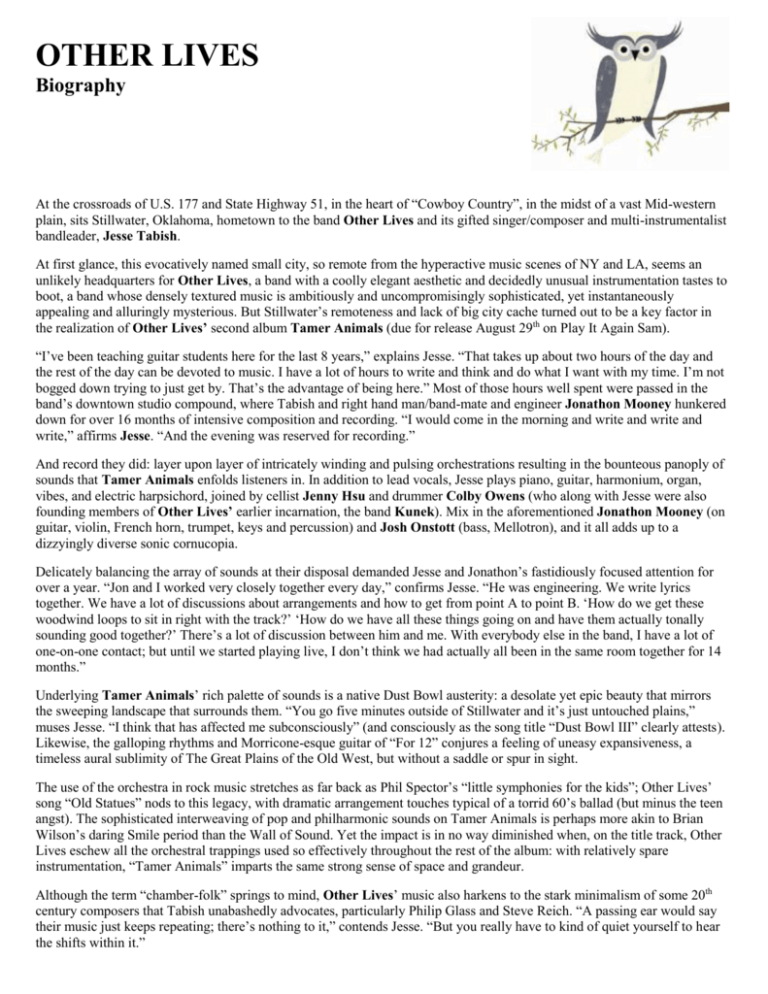
OTHER LIVES Biography At the crossroads of U.S. 177 and State Highway 51, in the heart of “Cowboy Country”, in the midst of a vast Mid-western plain, sits Stillwater, Oklahoma, hometown to the band Other Lives and its gifted singer/composer and multi-instrumentalist bandleader, Jesse Tabish. At first glance, this evocatively named small city, so remote from the hyperactive music scenes of NY and LA, seems an unlikely headquarters for Other Lives, a band with a coolly elegant aesthetic and decidedly unusual instrumentation tastes to boot, a band whose densely textured music is ambitiously and uncompromisingly sophisticated, yet instantaneously appealing and alluringly mysterious. But Stillwater’s remoteness and lack of big city cache turned out to be a key factor in the realization of Other Lives’ second album Tamer Animals (due for release August 29th on Play It Again Sam). “I’ve been teaching guitar students here for the last 8 years,” explains Jesse. “That takes up about two hours of the day and the rest of the day can be devoted to music. I have a lot of hours to write and think and do what I want with my time. I’m not bogged down trying to just get by. That’s the advantage of being here.” Most of those hours well spent were passed in the band’s downtown studio compound, where Tabish and right hand man/band-mate and engineer Jonathon Mooney hunkered down for over 16 months of intensive composition and recording. “I would come in the morning and write and write and write,” affirms Jesse. “And the evening was reserved for recording.” And record they did: layer upon layer of intricately winding and pulsing orchestrations resulting in the bounteous panoply of sounds that Tamer Animals enfolds listeners in. In addition to lead vocals, Jesse plays piano, guitar, harmonium, organ, vibes, and electric harpsichord, joined by cellist Jenny Hsu and drummer Colby Owens (who along with Jesse were also founding members of Other Lives’ earlier incarnation, the band Kunek). Mix in the aforementioned Jonathon Mooney (on guitar, violin, French horn, trumpet, keys and percussion) and Josh Onstott (bass, Mellotron), and it all adds up to a dizzyingly diverse sonic cornucopia. Delicately balancing the array of sounds at their disposal demanded Jesse and Jonathon’s fastidiously focused attention for over a year. “Jon and I worked very closely together every day,” confirms Jesse. “He was engineering. We write lyrics together. We have a lot of discussions about arrangements and how to get from point A to point B. ‘How do we get these woodwind loops to sit in right with the track?’ ‘How do we have all these things going on and have them actually tonally sounding good together?’ There’s a lot of discussion between him and me. With everybody else in the band, I have a lot of one-on-one contact; but until we started playing live, I don’t think we had actually all been in the same room together for 14 months.” Underlying Tamer Animals’ rich palette of sounds is a native Dust Bowl austerity: a desolate yet epic beauty that mirrors the sweeping landscape that surrounds them. “You go five minutes outside of Stillwater and it’s just untouched plains,” muses Jesse. “I think that has affected me subconsciously” (and consciously as the song title “Dust Bowl III” clearly attests). Likewise, the galloping rhythms and Morricone-esque guitar of “For 12” conjures a feeling of uneasy expansiveness, a timeless aural sublimity of The Great Plains of the Old West, but without a saddle or spur in sight. The use of the orchestra in rock music stretches as far back as Phil Spector’s “little symphonies for the kids”; Other Lives’ song “Old Statues” nods to this legacy, with dramatic arrangement touches typical of a torrid 60’s ballad (but minus the teen angst). The sophisticated interweaving of pop and philharmonic sounds on Tamer Animals is perhaps more akin to Brian Wilson’s daring Smile period than the Wall of Sound. Yet the impact is in no way diminished when, on the title track, Other Lives eschew all the orchestral trappings used so effectively throughout the rest of the album: with relatively spare instrumentation, “Tamer Animals” imparts the same strong sense of space and grandeur. Although the term “chamber-folk” springs to mind, Other Lives’ music also harkens to the stark minimalism of some 20th century composers that Tabish unabashedly advocates, particularly Philip Glass and Steve Reich. “A passing ear would say their music just keeps repeating; there’s nothing to it,” contends Jesse. “But you really have to kind of quiet yourself to hear the shifts within it.” Jesse believes that the deceptive simplicity and repetitive pulsing style that is the signature of those composers has strong ties to rock music. “Take a rock n’ roll song,” Jesse says. “It has three chords in it and it repeats and it repeats and it repeats.” But there is a deeper subliminal connection as well. “Before World War II you had Stravinsky, Ravel, Debussy, all this very beautiful lush romantic music. I think it’s hard for modern society to identify with that. It doesn’t capture the spirit of our time period as Glass and Reich does. There’s something very urban about them: it’s city life, NY early ‘70s. I think rock music can identify with that.” In the later phase of the Tamer Animals sessions, Joey Waronker (who produced Other Lives self-titled 2009 debut album) heard some tracks and offered the band some trusted feedback; eventually he was called in to help with the mixes. “I’m pretty headstrong when it comes to musical ideas,” assures Jesse. “But that’s not to say that I don’t need outside perspective. When Joey came in the latter half, he was much needed, for sure.” Nonetheless, the newfound hands-on creative flexibility that having their own studio put at their disposal was both liberating and empowering for Other Lives. “To be able to have it homemade in our own way, being completely in our own world without anybody looking in, figuring out the problems and sorting it through on our own was very freeing and very enjoyable,” confirms Jesse. “Having fun doing it and waking up every day and knowing this is in my control to make this what I want -- I don’t think I can turn back from that ever again!” Pushing boundaries seems to come quite naturally to Jesse Tabish, a position he asserts with un-dramatic but unrelentingly fervor: “Our band seems able to play ideas I never thought it would able to. I think I’m going to go with this and write whatever kind of music I want to write. I definitely have individual goals for what I want to accomplish in the future: more comprehensive, more thought out music. I definitely want to continue to push the line between composition and band. I would like those two worlds to collide!” James Sclavunos Stay Loose / matt@stayloose.co.uk / mob: 07939 527 656 / office: 0117 9736 558 / downloadable assets: www.stayloose.co.uk
